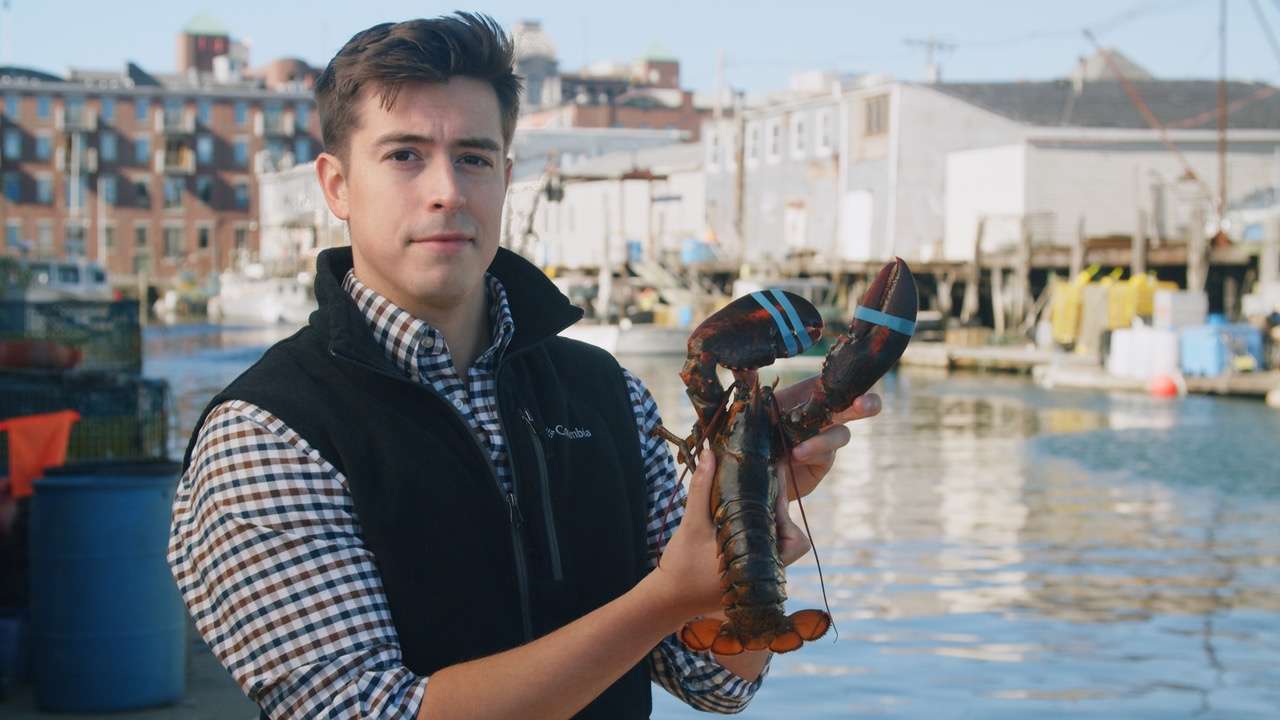
Skin care startup looks to a familiar Maine source for ingredient — lobster
 Courtesy / Marin Skincare
Marin Skincare’s co-founder and chief product officer, Amber Boutiette, is seen here with the startup’s debut product, which incorporates a protein found in lobster.
Courtesy / Marin Skincare
Marin Skincare’s co-founder and chief product officer, Amber Boutiette, is seen here with the startup’s debut product, which incorporates a protein found in lobster.
Two University of Maine graduate students discovered, on a hunch, that a protein derived from lobster could calm the dry, itchy flare-up of eczema.
That knowledge resulted in a startup that uses the protein to create a soothing skin cream, launched two weeks ago.
Patrick Breeding and Amber Boutiette are founders of the startup, Marin Skincare.
“We started manufacturing right when COVID hit,” Breeding told Mainebiz. “It extended the lead time for our product by four months. But that’s okay, because during that time, we built our brand and email list and prepared for our launch.”
Patch test
Boutiette has struggled with eczema for years and has tried various products, including steroids, without success.
The two met during their first years as undergraduate students, in 2013, at UMaine. They received their undergraduate degrees in 2017 and enrolled the same year in biomedical engineering graduate studies.
Their work involved finding new biotech applications for sustainable marine resources. Upon working with some of Maine’s marine resource industry experts that first year, Breeding learned about a substance, glycoprotein, derived from the lobster’s circulatory system.

Glycoproteins are naturally abundant in lobsters and other marine resources, explained Breeding. They help repair and protect the lobster’s outer barrier from physical and environmental stressors, while also playing a critical role in balancing the internal health of the lobster.
Breeding had an “aha!” moment.
“He looked at the literature, and based on his research in the lab, he hypothesized it could be used to hydrate the skin,” said Boutiette. “We figured, ‘Why not?’”
First, the entrepreneurs did a “patch” test. They mixed a fluid form of glycoprotein with Vaseline, which Boutiette had been using to help keep her skin from cracking, to help the glycoprotein stick on the skin.
In just a few days, her skin started clearing up, she said.
“In a week and a half, the itching and redness cleared up, she said. “My eczema has been gone since 2017.”
The process for isolating the protein is proprietary.
“That’s part of the secret sauce,” said Breeding.
The two, who are life partners as well as business partners, were happy that Boutiette finally had some relief. But they didn’t think anything further of it, at first.
“We were in school still,” said Boutiette. “We didn’t decide immediately to commercialize it. My eczema was gone, so we almost forgot about it.”
A year later, while they were in the middle of graduate school, Breeding’s father died of cancer. His death was an inflection point.
“We had an incredibly emotional time, thinking about what we wanted to do with our lives,” explained Breeding. “We wanted to do something that was fulfilling and would help people. We saw what it was like for people who were suffering.”
They had seen how much the glycoprotein application had improved Boutiette’s quality of life and realized it could help other people, too.
They graduated with their master’s degrees in 2019 and enrolled in the 2019 cohort of Scratchpad, a seed accelerator in Bangor that works with several “high-potential, high-growth entrepreneurial teams,” according to its website.
“In that process, we prepared ourselves to be scalable,” said Breeding.
That included developing a supply chain to source glycoprotein and to complete product testing and manufacturing.
Partnership with Luke’s Lobster
Breeding had heard of Luke’s Lobster and gave Luke Holden, its founder and CEO, a call. Immediately, Holden and Breeding started a collaboration to develop a method of collecting glycoprotein from lobsters at Holden's Saco processing plant. The process is performed in a sustainable and ethical manner, said Breeding.
“We were more than happy to work with Marin Skincare on developing this product,” Holden said in a news release. “This type of collaboration fits right into our mission to use every part of the lobster, which has an array of sustainable uses, and remarkable properties, in addition to being delicious to eat.”

Through Holden, they identified Ariel Laboratories in South Plainfield, N.J., as the manufacturer for the final product. Ariel is a custom formulation skin care product development manufacturer. The lab participated in product formulation.
“We’d go back and forth with them,” said Breeding. “We asked for qualitative qualities like texture and after-feel. They’d come back to us and say, ‘What’s the scientific characterization of that?’ So we met in the middle and found the right formula.”
Lots of driving
Production begins when Breeding shows up at Holden’s processing plant at 5 a.m. every morning.
“I probably spent 700 to 800 hours this summer collecting the protein from the lobster,” Breeding said.
He uses a proprietary set-up that’s so far collected hundreds of pounds of glycoprotein. The next step involves a trip to Breeding and Boutiette's South Portland home, where they’ve set up a sterile environment for pre-processing.
Then they load the protein into a freezer and drive it to Ariel Laboratories. They’ve made numerous round trips over the past months.
Funding
In the same period, they raised angel funding of “a couple of tens of thousands of dollars,” some from an anonymous donor and some from a primary investor named Jeremy Boutot, who has signed on as COO. Boutot, from Bangor, has experience working at e-commerce companies and tech startups, said Breeding.
Boutot, Breeding and Boutiette met when they participated in the Maine Center for Entrepreneurs’ Top Gun accelerator program a couple of years ago, when they were all working on other projects.
Breeding and Boutiette also received a $25,000 grant from the Maine Technology Institute and a $5,000 grant from the Libra Foundation.
In early October, the first batch of product, branded as Soothing Hydration Cream, came off the line. The first batch consists of 2,500 tubes. The branding, which went through scores of iterations, was designed to be “not too clinical but not to much like a beauty product,” said Breeding.
The cream blends glycoprotein with skin hydrating and protecting ingredients, including hyaluronic acid, squalane, shea butter, coconut oil and vitamin E. The market includes people with eczema, dermatitis and other dry, aggravated skin issues. The product is designed to help protect the skin’s barrier, while locking-in hydration and minimizing skin moisture loss. A third -party lab has demonstrated the product is safe and non-irritating, said Breeding.
The partners have launched a website with an online shopping portal, and customer testimonials have started to come in, said Breeding.
“We're 100% e-commerce right now so online sales through our site (direct-to-consumer) will be our only channel,” he said. “We will be leveraging social media marketing and influencer marketing campaigns to drive brand awareness. As online sales come in, our plan is to introduce new products to complete a 'line' of products, making our brand suitable for retail. In the next year we hope to find retail partners to stock our products, with a particular eye for skincare/beauty outlets such as Sephora and Ulta, as well as local Maine retailers.”
They’ve sold dozens in the first two weeks since the product launched on Oct. 5, have been shipping out product daily and reviews have started to come in, said Breeding.
He added, “We have a super unique story tied to Maine, to the Maine economy, and to one of Maine’s most sustainable fishery."
For more information, click here.













0 Comments